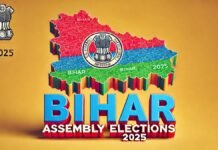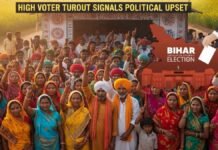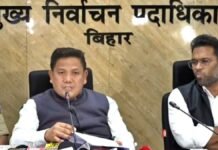
Key Points
- The Election Commission of India announced a two-phase voting schedule for all 243 Bihar Assembly seats on November 6 and 11, 2025, with counting scheduled for November 14
- Phase 1 will cover 121 seats across 18 districts on November 6, while Phase 2 will encompass 122 seats across 20 districts on November 11
- Model Code of Conduct came into immediate effect across Bihar following the announcement made by Chief Election Commissioner Gyanesh Kumar at Vigyan Bhawan, New Delhi
- Over 7.43 crore (74.3 million) voters including 3.92 crore males, 3.50 crore females, and 1,725 transgender voters are eligible to participate in the elections
- A record 1.4 million first-time voters aged 18-20 years will cast their ballots, while 14,000 centenarians are registered to vote
- The Election Commission introduced 17 new initiatives including the launch of “ECINet” single-window app, webcasting at all 90,712 polling booths, and deployment of one General Observer per constituency
- Notification for Phase 1 will be issued on October 10 with nominations closing on October 17, while Phase 2 notifications on October 13 with nominations deadline on October 20
New Delhi: The Election Commission of India formally announced the schedule for the 18th Bihar Legislative Assembly elections at a press conference held at Vigyan Bhawan in the national capital on Sunday, October 6, 2025. Chief Election Commissioner Gyanesh Kumar declared that voting will take place in two phases on November 6 and 11, with results to be declared on November 14, well ahead of the current Assembly’s term expiration on November 22.
The decision to conduct elections in two phases instead of the traditional three phases represents a significant departure from the 2020 polls, which were held in three phases amid the COVID-19 pandemic. This strategic decision aims to minimize election-related disruptions while maximizing voter participation, particularly enabling those returning home for Diwali and Chhath Puja festivities to exercise their franchise.
With the formal announcement, the Model Code of Conduct has immediately come into effect across Bihar, imposing restrictions on government announcements, transfers, and policy decisions until the completion of the electoral process.
Phase-Wise Electoral Breakdown
First Phase: 121 Seats Across Central and Northern Bihar
The first phase of voting scheduled for Thursday, November 6, will cover 121 assembly constituencies spread across 18 districts in central and northern Bihar. The districts going to polls in Phase 1 include Patna, Gopalganj, Siwan, Saran, Bhojpur, Buxar, Muzaffarpur, Vaishali, Nalanda, Darbhanga, Samastipur, Sheikhpura, Begusarai, Lakhisarai, Saharsa, Khagaria, Munger, and Madhepura.
Notably, 71 of the 121 constituencies in Phase 1 are largely the same seats that voted in the first phase during the 2020 elections, spread across 16 districts. The notification for first-phase voting will be issued on October 10, allowing candidates to file nominations until October 17, with scrutiny on October 18 and final withdrawal deadline on October 20.
Second Phase: 122 Seats Along Border Districts
The second phase on Tuesday, November 11, will encompass 122 assembly constituencies across 20 districts, primarily covering border areas near Nepal and eastern Bihar. Districts voting in Phase 2 include West Champaran, East Champaran, Sitamarhi, Sheohar, Madhubani, Supaul, Araria, Kishanganj, Purnia, Katihar, Bhagalpur, Banka, Jamui, Nawada, Gaya, Arwal, Aurangabad, Jehanabad, Sasaram, and Kaimur.
The second-phase notification will be issued on October 13, with the last date for filing nominations set as October 20, scrutiny on October 21, and withdrawal deadline on October 23. The Election Commission has color-coded its official map with yellow denoting Phase 1 constituencies and pink representing Phase 2 areas for easy voter identification.
Massive Electoral Demographics
7.43 Crore Voters to Decide Bihar’s Political Future
Bihar’s electorate comprises an impressive 7.43 crore (74.3 million) registered voters who will determine the composition of the state’s 243-member Assembly. The voter demographic includes approximately 3.92 crore (39.2 million) male voters, 3.50 crore (35 million) female voters, and 1,725 transgender voters registered across the state.
The state boasts 14,000 centenarian voters above 100 years of age, demonstrating the enduring commitment of elderly citizens to democratic participation. Additionally, approximately 4.04 million voters fall in the 85-100 age bracket, representing a significant senior citizen voting bloc.
1.4 Million First-Time Voters
A remarkable 1.4 million young voters aged between 18 and 20 years will exercise their franchise for the first time in these assembly elections, injecting fresh democratic energy into the electoral process. The youth demographic is further bolstered by 1.63 crore (16.3 million) voters in the 20-29 age group, making young voters a crucial determinant of electoral outcomes.
The state also has 7.2 lakh (720,000) specially-abled voters and 1.63 crore (16.3 million) service voters, for whom the Election Commission has made special arrangements to ensure barrier-free voting.
Revolutionary Electoral Initiatives
17 New Measures to Enhance Electoral Integrity
Chief Election Commissioner Gyanesh Kumar announced the implementation of 17 groundbreaking initiatives specifically for the Bihar elections, which are intended to serve as models for nationwide replication in future polls. These measures encompass innovations in both the voting and counting processes, aimed at enhancing transparency, accessibility, and efficiency.
The flagship initiative is the launch of “ECINet,” described as the “mother of all election apps,” which will serve as a single-window platform integrating all election-related applications and services. This comprehensive digital solution will debut during the Bihar elections, marking a significant technological advancement in election management.
Comprehensive Monitoring and Transparency Measures
For the first time in Indian electoral history, one General Observer will be deployed in each of Bihar’s 243 constituencies to function as the eyes and ears of the Election Commission, ensuring meticulous oversight of the electoral process. This represents an unprecedented level of monitoring with a dedicated observer for every constituency.
All 90,712 polling booths across Bihar will feature mandatory webcasting throughout the voting process, enabling real-time monitoring and ensuring complete transparency. This comprehensive surveillance system aims to eliminate any possibilities of malpractice or irregularities during polling.
Voter-Friendly Infrastructure
The Election Commission has mandated that no polling booth in Bihar will have more than 1,200 registered voters, ensuring manageable queues and smoother voting experiences. All polling stations will be established on ground floors to ensure accessibility for elderly and specially-abled voters.
Electronic Voting Machines (EVMs) will display colored photographs of candidates, with names and serial numbers printed in bold letters for enhanced clarity and easier identification, particularly benefiting voters with visual impairments. New voter identity cards will be issued promptly to all citizens whose names have been newly added to the electoral rolls.
Multi-Tier Voter Assistance Framework
Voters can access comprehensive support through multiple channels including 90,712 Booth Level Officers (BLOs), 243 Electoral Registration Officers (EROs), 38 District Magistrates, or directly contact the Chief Electoral Officer in Patna through the dedicated 1950 voter helpline. This multi-layered assistance mechanism ensures that no voter faces difficulties in exercising their democratic rights.
The Election Commission has specifically urged political parties to appoint polling agents at all booths and counting agents at all counting centers to ensure complete transparency and satisfaction among all stakeholders regarding the fairness of the electoral process.
Stringent Security and Anti-Malpractice Measures
Zero Tolerance Policy on Violence
District Magistrates and Superintendents of Police across all 38 Bihar districts have received explicit instructions to maintain zero tolerance toward any form of electoral violence. Adequate deployment of Central Armed Police Forces (CAPF) will be ensured throughout the state to maintain law and order during the entire election period.
Strict vigilance will be maintained at numerous checkpoints across the state to prevent illegal movement of drugs, cash, and liquor, which have historically influenced electoral outcomes. CEC Kumar emphasized that any suspicious activity will be promptly addressed with stringent action.
Combating Fake News and Misinformation
The Election Commission has established dedicated mechanisms for monitoring social media platforms and identifying fake news that could mislead voters or disrupt the electoral process. A robust complaint redressal system has been instituted to ensure that all grievances received during the voting process are addressed promptly and effectively.
The Commission has deployed over 8.5 lakh officers for conducting the Bihar elections, reflecting the massive logistical operation required to ensure free, fair, and peaceful polling. CEC Gyanesh Kumar described Bihar polls as “the mother of all elections,” underscoring the state’s critical importance in India’s democratic landscape.
Political Battleground Takes Shape
The elections will witness a three-cornered contest among the ruling National Democratic Alliance (NDA) led by Chief Minister Nitish Kumar and the BJP, the opposition INDIA bloc spearheaded by the Rashtriya Janata Dal (RJD) and Congress, and Prashant Kishor’s newly launched Jan Suraj Party. Key electoral issues expected to dominate campaign narratives include unemployment, demand for special category status, the Socio-Economic and Caste Census (SECC/SIR), caste-based reservations, and migration.
Deputy Chief Minister Vijay Kumar Sinha expressed confidence that “Bihar election will set an example for the country…These elections will be a testament to the strength of democracy,” while Union Minister Giriraj Singh asserted that NDA government formation with more than two-thirds majority is certain. The electoral outcome on November 14 will determine the political trajectory of one of India’s most politically significant states.




















































